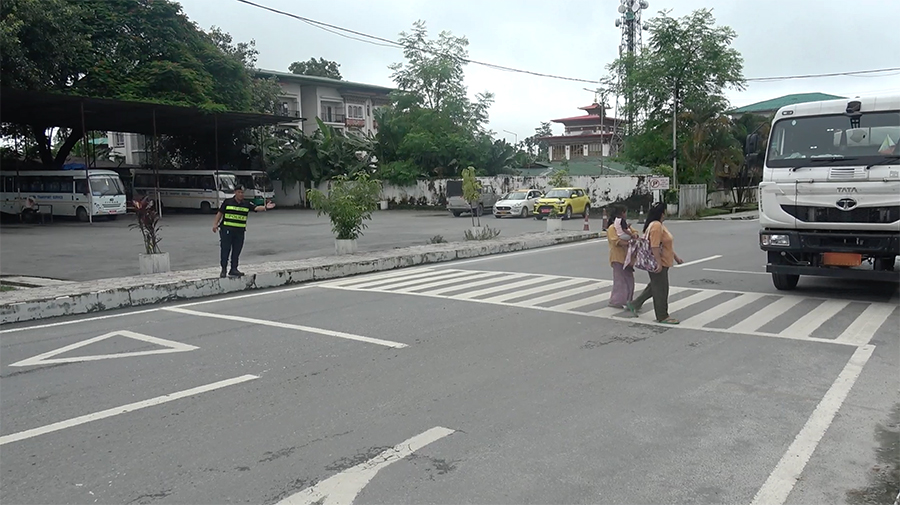 As Bhutan’s first mindfulness city takes shape in Gelephu, one of the earliest and most visible changes for residents is on the roads. The Royal Bhutan Police’s traffic division is shaping the town’s character not with towering buildings or futuristic parks, but by transforming the way people drive.
As Bhutan’s first mindfulness city takes shape in Gelephu, one of the earliest and most visible changes for residents is on the roads. The Royal Bhutan Police’s traffic division is shaping the town’s character not with towering buildings or futuristic parks, but by transforming the way people drive.
Residents and commuters are finally getting a sense of what living in a disciplined and mindful city might be like.
 Over the past weeks, commuters in Gelephu have noticed a change, especially in the evening. Police are enforcing traffic rules rigorously.
Over the past weeks, commuters in Gelephu have noticed a change, especially in the evening. Police are enforcing traffic rules rigorously.
Drivers have been pulled over, fined, and reminded to follow the traffic rules starting this month.
 The light vehicles and two-wheelers have to ensure speed limits of 50 kilometres per hour, while medium and heavy vehicles at 35. All vehicles have to be driven at 20 kilometres per hour near settlements.
The light vehicles and two-wheelers have to ensure speed limits of 50 kilometres per hour, while medium and heavy vehicles at 35. All vehicles have to be driven at 20 kilometres per hour near settlements.
Other zero-tolerance offences include reckless driving, drink-driving, driving without a licence, and using mobile phones behind the wheel.
 Traffic police are also ensuring mandatory seat belt use for both drivers and front-seat passengers, with fines soon to follow for non-compliance.
Traffic police are also ensuring mandatory seat belt use for both drivers and front-seat passengers, with fines soon to follow for non-compliance.
During the initial phase of enforcement, police collected fines exceeding 50,000 ngultrum in a single day. However, as public awareness improves, traffic violations have significantly declined. In Gelephu, the path to mindful living begins with mindful driving on the city’s roads.
“It is a good thing that traffic rules have been made stricter here; it is for everyone’s safety. As professional drivers, we follow the rules, but there are still some private drivers without licences. The new system will help keep the roads safe,” said Thinley Namgay, the taxi driver.
“The only challenge is the new 50 kilometres per hour speed limit. Modern cars are quite sensitive, and with just a light push on the accelerator, they quickly reach 40 to 50 kilometres per hour. It can also be difficult to maintain that limit when overtaking,” said Thinley Namgay, another taxi driver.
Pedestrian safety is also a priority.
 CCTV cameras are monitoring crossings and wrong parking in town areas, while police remind pedestrians to use zebra crossings.
CCTV cameras are monitoring crossings and wrong parking in town areas, while police remind pedestrians to use zebra crossings.
The improved road marking is ensuring lane discipline and proper overtaking, especially among heavy vehicles.
According to police, the rules were preceded by several months of focused outreach.
Awareness campaigns were carried out among taxi drivers, public buses, and even Indian truckers transporting boulders.
Passang Dorji, Gelephu









